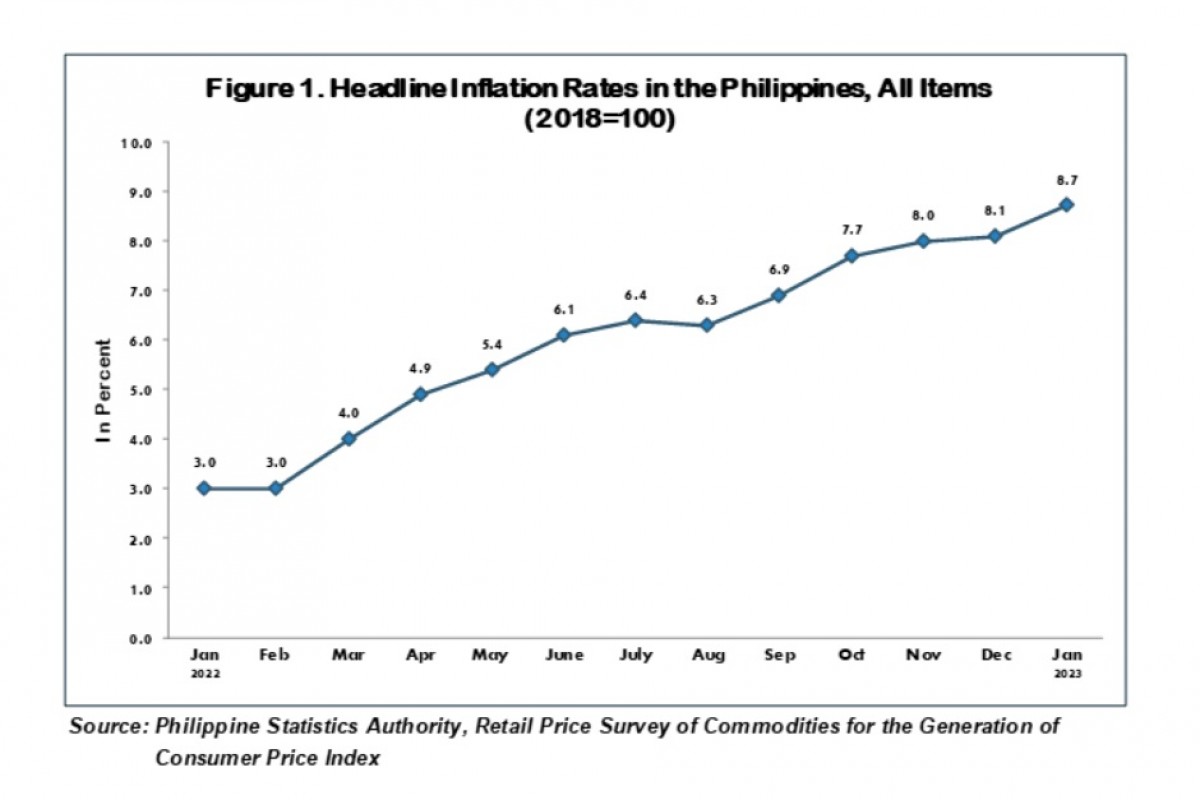QUEZON CITY (PIA) -- The Philippine Statistics Authority (PSA) reported the country's inflation rate accelerates to 8.7% in January 2023 from the 8.1% rate reported in December 2022. This is the highest annual inflation rate recorded since November 2008.
According to International Monetary Fund (IMF), inflation is the rate of increase in prices over a given period of time. It is typically a broad measure of the overall increase in prices and/or the increase in the cost of living in a country.
The main contributors to the increase in inflation are the higher year-on-year increase in the index of housing, water, electricity, gas, and other fuels at 8.5 percent.
This was followed by food and non-alcoholic beverages at 10.7 percent. Also contributed to the increase in inflation were restaurants and accommodation services with a rate of 7.6 percent.
Relative to their annual rates in the previous month, higher annual increases were also observed in the indices of the following commodity groups:
a. Alcoholic beverages and tobacco, 10.9 percent;
b. Clothing and footwear, 4.4 percent;
c. Furnishings, household equipment and routine household maintenance, 5.2 percent;
d. Health, 3.3 percent;
e. Recreation, sport and culture, 4.2 percent; and
f. Personal care, and miscellaneous goods and services, 5.0 percent.
Meanwhile, food inflation at the national level climbed to 11.2 percent in January 2023, from 10.6 percent in December 2022.
The higher food inflation was mainly brought about by the increased year-on-year growth in the index of vegetables, tubers, plantains, cooking bananas and pulses. Moreover, higher annual mark-ups were observed in the indices of the following food groups during the month:
a. Flour, bread and other bakery products, pasta products, and other cereals, 11.3 percent;
b. Fish and other seafood, 6.7 percent;
c. Milk, other dairy products and eggs, 11.3 percent; and
d. Fruits and nuts, 9.8 percent.
Meanwhile, lower annual growth rates were observed in the indices of the following food groups in January 2023:
a. Rice, 2.7 percent;
b. Corn, 16.0 percent;
c. Meat and other parts of slaughtered land animals, 7.0 percent;
d. Oils and fats, 18.5 percent; and
e. Ready-made food and other food products not elsewhere classified, 9.2 percent.
The index of sugar, confectionery, and desserts retained its previous month’s growth rate of 38.8 percent.

Meanwhile, President Ferdinand R. Marcos Jr. is still positive that we will all see the country’s inflation rate drop as the prices of fuel and imported agricultural products slide down. According to the President’s estimate, the lowering of the interest rates will be seen by the second quarter of this year.
President Marcos assures that the government has already taken measures to increase the supply of agricultural products which in turn will bring their prices down although this will take time and the measures that the government has implemented “have not yet gone through the system.”
According to the National Economic and Development Authority (NEDA), the government has identified measures to keep food price movements consistent with its inflation and food security objectives.
“As part of the administration’s 8-point agenda and the Philippine Development Plan 2023-2028, the government is implementing measures to ease price pressures and cushion the impact of inflation, especially on basic commodities,” NEDA Secretary Arsenio M. Balisacan said.
The short-term measures consist of augmentation of supply as through temporary easing of import restrictions, price monitoring, and targeted social support. Meanwhile, medium- to long-term priorities include ensuring food security through higher agricultural productivity and ensuring energy security by pursuing the energy transition and development program.
The economic managers of the President anticipate inflation to moderate from 2023 to 2024. Furthermore, the effect of Bangko Sentral ng Pilipinas (BSP) rate hikes is estimated to be felt this 2023. (ARB/KSAA - PIA-CPSD)



